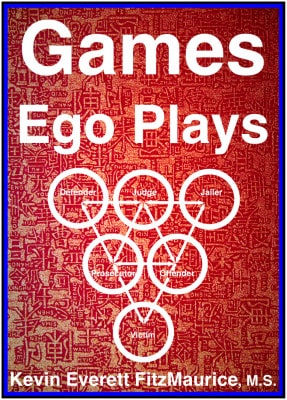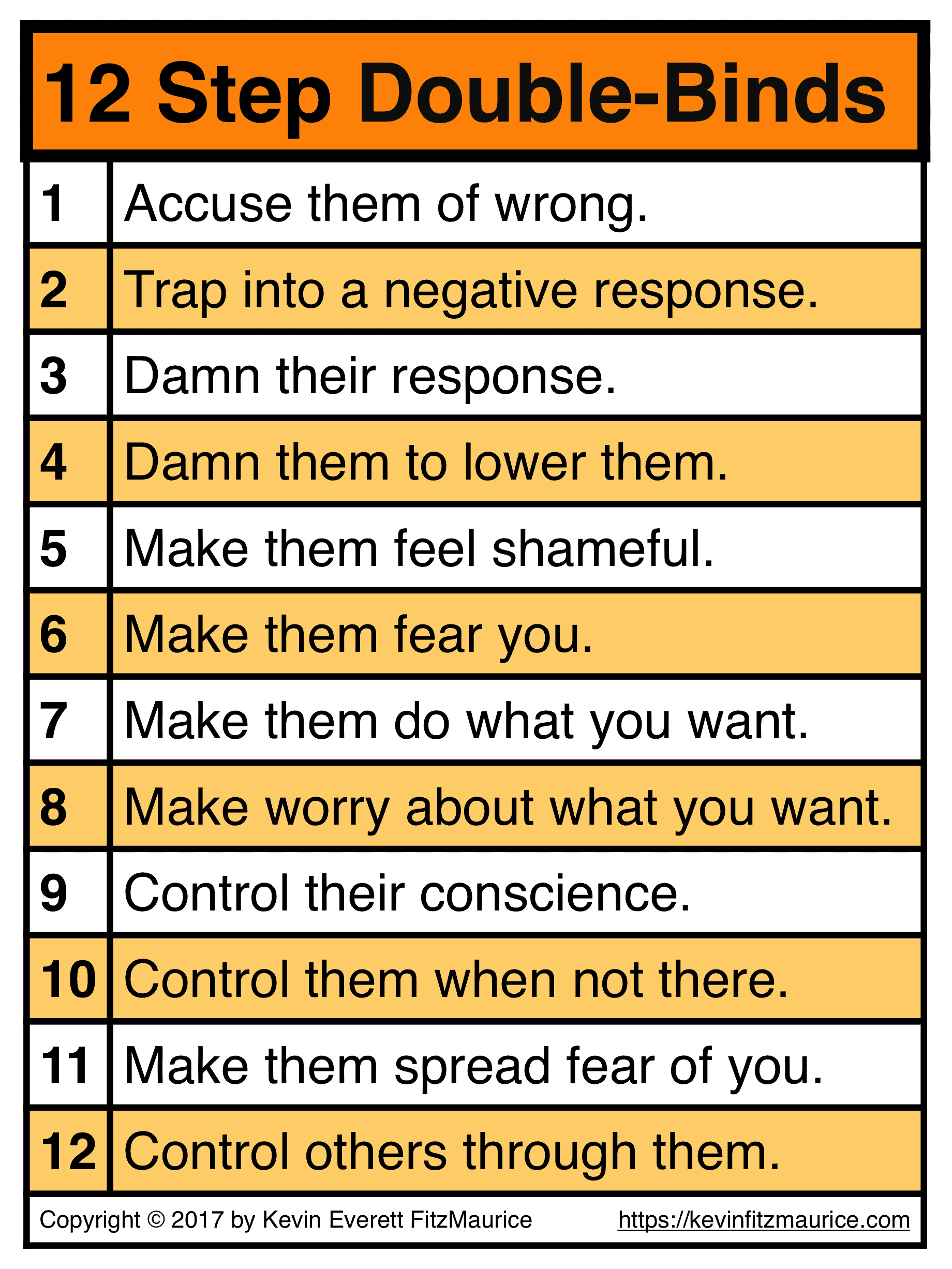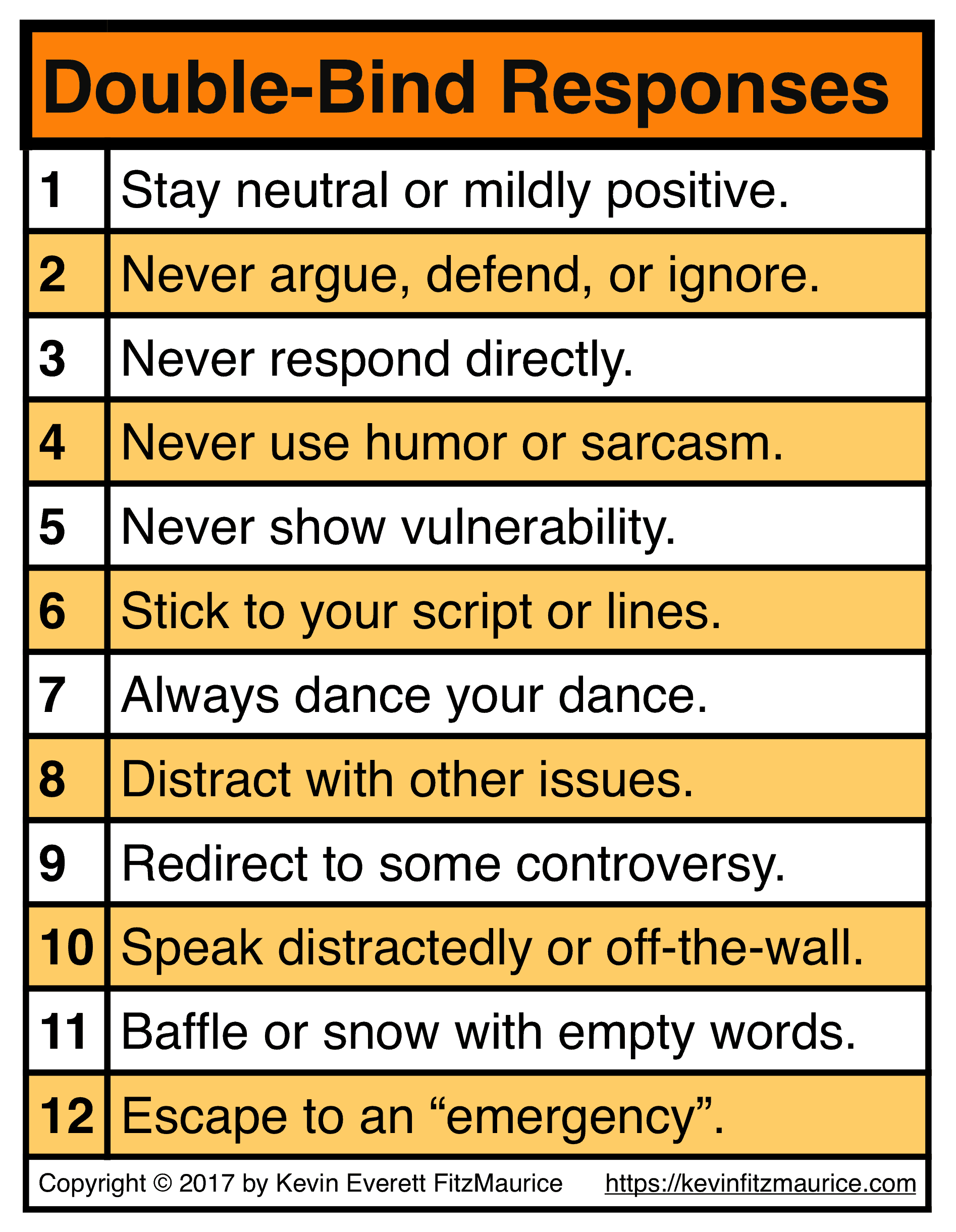Persistently Redirect to Positive Agreement
- Manipulation games are diagramed & explained in Games Ego Plays.
- Understand the problems of using “don’t” & “can’t” in Not.
Double-bind questions are no-win questions designed to manipulate you. Persistently redirect to a positive agreement.
What to do When People Ask You No-Win Questions?
No-win questions are also known as double-bind questions.
- There is a theory of schizophrenia from the Milan group in Italy that claims that schizophrenia can be caused by frequent exposure to double binds while one is growing up.
- In effect, enough double-binds can eventually break your brain.
- No-win questions are questions that will convict and condemn you no matter how or in which way you answer them.
- These suggestions are for dealing with people who are angry, physically threatening, violent, or who you know intimately.
- Read for the best maps and diagrams of how people manipulate and control you.
Double-Bind Questions: Frequent
- Perhaps the most often cited double-bind question is:
- “Have you stopped beating your wife yet?”
- Clearly, either a “yes” or a “no” answer will convict and condemn you.
Double-Bind Questions: Don’t
- The most common double-bind or no-win questions involve the use of “don’t”:
- “Don’t you love me?”
- “Don’t you care?”
- “Don’t you want to make something of yourself?”
- “Don’t you want to be successful?”
- “Don’t you want to make me happy?”
- “Don’t you understand me?”
- “Don’t you want to go to college?”
- “Don’t you know better than that?”
Double-Bind Questions: The Trap Shuts
- If you say “yes,” then the response is to ask why you didn’t then or don’t now, then do what you should if you know what to do.
- If you say “no,” the response is you are defective, bad, worthless, stupid, etc., for not knowing what you should do: the right thing according to their values.
CAN’T Double-Binds
- The second most common form of no-win questions involves the use of “can’t”:
- “Can’t you ever do anything right?”
- “Can’t you even do one thing for me?”
- “Can’t you ever think of anyone but yourself?”
- “Can’t you think for yourself?”
- “Can’t you do better than that?”
WHY Double-Bind Questions
- The third most common form of no-win questions involves the use of “why”:
- “Why do you want to hurt me?”
- “Why are you always failing?”
- “Why do you have to be so mean?”
- “Why do you always take your mother’s side?”
- “Why do I put up with you?”
- “Why do you procrastinate so much?”
- “Why were you born?”
Double-Bind Questions: If … Then …
- Another variation is the “if … then …” format, for example:
- “If you really loved me, then you would do this for me.”
- Some creative types manage to combine some for even more stress, for example:
- “Why don’t you care about your family?”
- Any question can be turned into a double-bind, for instance:
- “Is that the way you want to make me feel?”
Double-Bind Questions: Other Kinds
- Double-binds can also take the form of statements.
- For example, “After all I have done for you, the least you could do is to do this one thing for me.”
- Double-binds can be understood as a rhetorical question that is not rhetorical.
Double-Bind Questions: Still More Kinds of Traps
- “Does it bother you that …?”
- “What do you have to say for yourself?”
- “So, what you are saying is ….”
- “So, you are basically saying that ….”
- “Why should we (they) put up with …?”
Double-Bind Questions: Main Rule for Recognizing
- Double binds occur whenever you sense that answering or responding with either “yes” or “no” will be wrong.
- Read for the best maps and diagrams of how people manipulate and control you.
Double-Bind Questions: How They Do It: 12 Steps
- Know how they do it so you can see it coming and avoid it.
- Use this to prevent being hooked into a losing game.
- Click for a page on how to handle difficult people.
- Read for the best maps and diagrams of how people manipulate and control you.
Double-Bind Questions: How to Avoid the Traps
- Now that we have defined the traps, how can we avoid them?
- The basic format is to respond with a positive statement about the same or a closely related topic.
- You do not answer the question; however, you do not ignore the person.
Double-Bind Questions: Examples
- Question: “Don’t you want to succeed?”
- Response: “I really like it when I am productive.”
- Question: “Don’t you care about your family?”
- Response: “I really like it when we are all together.”
- Question: “Can’t you ever do anything right?”
- Response: “I really like it when things work out.”
Double-Bind Questions: Sentence stems you can use to build ready-made responses:
“I really like it ….”
“I enjoy ….”
“It feels good to ….”
“I prefer it when ….”
“It is nice when ….”
Double-Bind Questions: Second Attack
- It is quite possible and even likely, in some cases, that they will attack your first positive statement with either another double-bind or a direct question.
- For instance, they may ask, “What is that supposed to mean?”
- Then, you say the same thing with different words, paraphrasing what you just said.
Double-Bind Questions: For Example
- Question: “Can’t you ever think of anyone but yourself?”
- Response: “It really is good to share feelings with others.”
- Question: “What is that supposed to mean?”
- Response: “I enjoy the good company of others.”
Double-Bind Questions: Persistence Wins
- Whatever their response—keep making positive statements about the topic.
- And keep making new ones or at least variations on the same one.
- If you persist and do not get hooked, they will give up and have nothing to blame or damn you for.
Double-Bind Questions: Further Hints & Suggestions
- Do not appear too or overly positive in your responses.
- They will often attack that because they want to hook and trigger you.
- While they are talking, show a little below-neutral mood or affect.
- While you are responding, show a little above neutral mood or affect.
- This shows remorse and change.
Perform the Role, Don’t Be the Role
- Give them what they want outside, but keep true to yourself inside.
- Remember, acting a role does not hurt your integrity.
- Please stick to your dance, and do not dance to their steps.
- You cannot dance their dance and win.
- Your dance keeps you out of the game of winner-loser.
- Use your normal language.
- If you use fancy or abstract language, they may accuse you of psychobabble or playing with them.
- Never become or respond as if you are a target.
Neutral Responses Better Than Silence
- Of course, this technique is not guaranteed. It works only some of the time.
- However, it does often work in a situation where most responses only tend to inflame.
- Your attacker does not want to be avoided.
- They do not want silence.
- They want to trap you, so they might blame and damn you.
- By stating the positive over and over again, they will eventually be left only with their negative.
- They want an external enemy to focus on—do not give them one.
Double-Bind Questions: 2 Books That Will Help
- Manipulation games are diagramed & explained in Games Ego Plays.
- Understand the problems of using “don’t” & “can’t” in Not.
- Read for the best maps and diagrams of how people manipulate and control you.
Double-Bind Questions: How to Respond
- Click for a page on how to handle difficult people.
Double-Bind Questions: Intimate Relationships
- When you experience double-binds in non-intimate relationships, then you have more options.
- However, if the person is angry or physically threatening, then use the above suggestions for intimate relationships.
- If the person is not angry, intimate, or violent, then humor might break the double bind.
- Providing options might break the double bind if the person is not angry, intimate, or violent.
- If the person is not angry, intimate, or violent, then reversing the bind onto them might work.
- If the person is not angry, intimate, or violent, then just pointing out the trap or double-bind might work.
- Read for the best maps and diagrams of how people manipulate and control you.
Double-Bind Questions: Quotations Various Sources
Listed Alphabetically
“A soft answer turneth away wrath: but grievous words stir up anger.” —Proverbs 15:1
“Against criticism, a man can neither protest nor defend himself; he must act despite it, and then it will gradually yield to him.Johann Wolfgang von Goethe (1749-1832)
“Agree with thine adversary quickly, whiles thou art in the way with him; lest at any time the adversary deliver thee to the judge, and the judge deliver thee to the officer, and thou be cast into prison. Verily I say unto thee, Thou shalt by no means come out thence, until thou hast paid the uttermost farthing.” —Matthew 5:25-26
“Among my most prized possessions are words that I have never spoken.” —Orson Card
“Be the change you seek.” —Mahatma Gandhi
“Be who you are and say what you feel, because those who mind don’t matter and those who matter don’t mind.” —Dr. Seuss
“But as he which hath called you is holy, so be ye holy in all manner of conversation;” —I Peter 1:15
“Don’t speak unless you can improve on the silence.” —Spanish proverb
“Draw me not away with the wicked, and with the workers of iniquity, which speak peace to their neighbours, but mischief is in their hearts.” —Psalms 28:3
“Even a fool, when he holdeth his peace, is counted wise: and he that shutteth his lips is esteemed a man of understanding.” —Proverbs 17:28
“Foolishness always results when the tongue outraces the brain.” —Unknown
“For if you give a person love and kindness when he does not by his actions merit it, he will see that you probably really love him.” —Albert Ellis and Robert A. Harper, A Guide to Rational Living, Third Edition, p. 142
“I don’t have to attend every argument I’m invited to.” —Anonymous
“If it be possible, as much as lieth in you, live peaceably with all men.” —Romans 12:18
“Nonviolence means avoiding not only external physical violence but also internal violence of spirit. You not only refuse to shoot a man, but you refuse to hate him.” —Martin Luther King, Jr.
“Pleasant words are as an honeycomb, sweet to the soul, and health to the bones.” —Proverbs 16:24
“Some man holdeth his tongue, because he hath not to answer: and some keepeth silence, knowing his time.” —Ecclesiasticus 20:6
“The first duty of love is to listen.” —Paul Tillich, 1886-1965
“The most precious things in speech are pauses.” —Ralph Richardson
“There is nothing that so much gratifies an ill tongue as when it finds an angry heart.” —Thomas Fuller
“To show resentment at a reproach is to acknowledge that one may have deserved it.” —Tacitus
“Treat a man as he is, and he will remain as he is. Treat a man as he could be, and he will become what he should be.” —Ralph Waldo Emerson
- Read for the best maps and diagrams of how people manipulate and control you.
Double-Bind Questions: Related Pages
- 25 Relational Styles
- Difficult People: How to Handle
- Don’t Argue Reality
- Ego Maintains Fights
- Memes on Communication
- Whiners: Learn How to Stop Them
- Read for the best maps and diagrams of how people manipulate and control you.
- Read and master the life skill of acceptance using the best combination of CBT, REBT, & Stoicism.
Double-Bind Questions: 6 Groups of Topics Menu
- 1. Pages by Topic
- 2. Fast-Facts by Topic
- 3. Quotations by Topic
- 4. Poems by Topic
- 5. Scripture by Topic
- 6. Websites by Topic
- Read and master the life skill of acceptance using the best combination of CBT, REBT, & Stoicism.
Double-Bind Questions: 10 Skills & Topics Menu
- 1. Coping Skills & Topics
- 2. Problem-Solving Skills & Topics
- 3. Communication Skills & Topics
- 4. Recovery Skills & Topics
- 5. Anger Skills & Topics
- 6. Blame Skills & Topics
- 7. Thinking Skills & Topics
- 8. Responsibility Skills & Topics
- 9. Counseling Skills & Topics
- 10. Praying Skills & Topics
- Read and master the life skill of acceptance using the best combination of CBT, REBT, & Stoicism.




